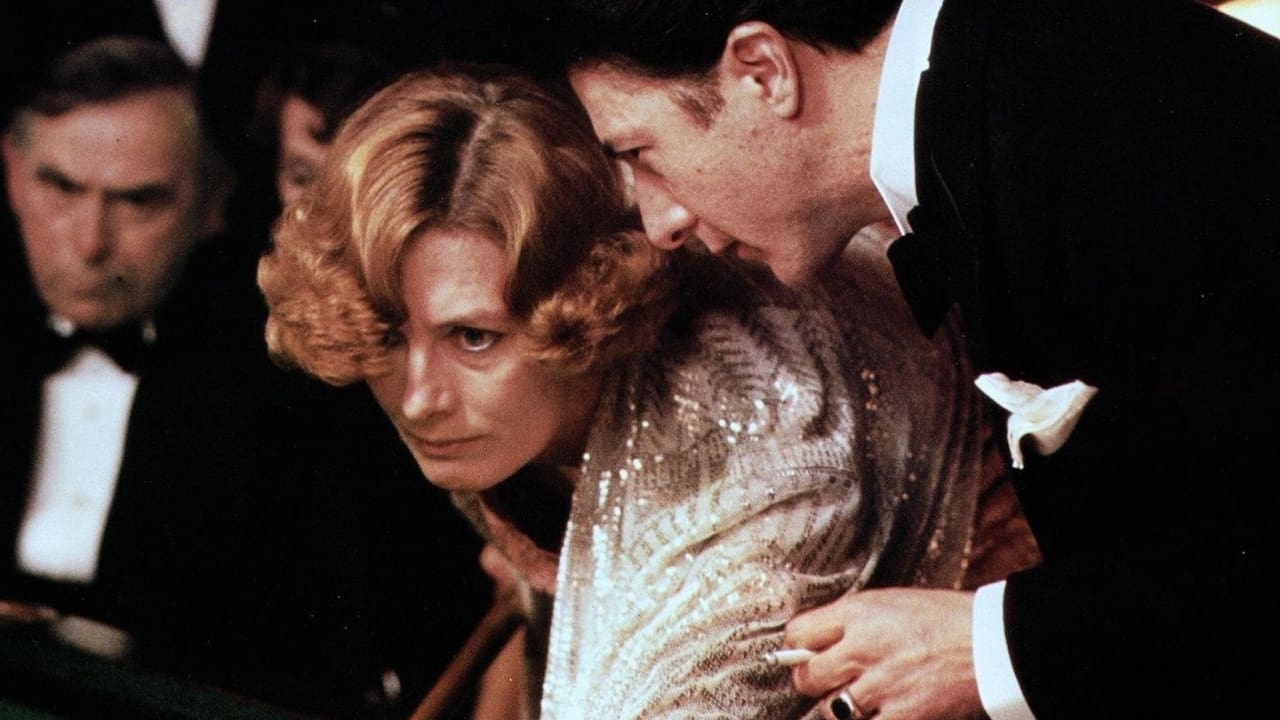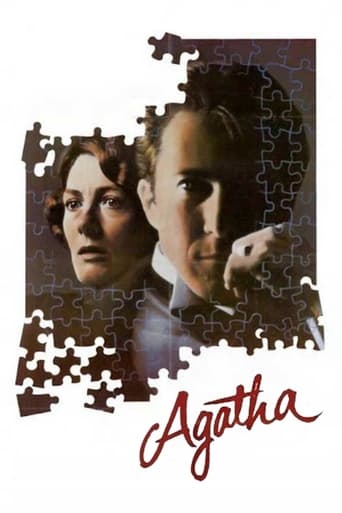Matrixston
Wow! Such a good movie.
Afouotos
Although it has its amusing moments, in eneral the plot does not convince.
Janae Milner
Easily the biggest piece of Right wing non sense propaganda I ever saw.
Beulah Bram
A film of deceptively outspoken contemporary relevance, this is cinema at its most alert, alarming and alive.
moonspinner55
Pushy American journalist joins the search in 1926 Britain for mystery writer Agatha Christie, who has disappeared upon learning of her husband's extramarital affair, leaving behind a cryptic note taken to be suicidal. Exceedingly handsome production (plagued with troubles behind-the-scenes) is a fictionalized account of a relative non-event, the secret of which Christie apparently took to her grave. Screenwriters Kathleen Tynan and Arthur Hopcraft seem to think they're writing a mystery story along the lines of something the real-life Agatha might have concocted (at least it was marketed that way) but, with so little happening, attention falls on the performances of leads Dustin Hoffman and Vanessa Redgrave. Hoffman, exhaling cigarette smoke through his nostrils, is almost intentionally unappealing; he looks tiny standing next to his lanky co-star, and is unbearably mannered and stiff (it's one of his weakest performances). Redgrave looks stunning in her elaborate, Oscar-nominated '20s ensembles, and almost manages to create a character even though she's working from next to nothing (the picture is a showcase for her marvelously well-attired look and the graceful way she carries herself--all externals). The direction by Michael Apted is sleek and smooth, relying on the decorative detail to hold our interest. ** from ****
malcolmgsw
At the time this film was made Dustin Hoffmans career was on a downward curve.He was at the time managed by Jarvis Astaire,who is one of the credited producers.The part as originally written was very small.However Hoffman was persuaded to take the part on the basis of it being written up.This is what happened.So that you have long stretches of the film where Hoffman is not present and then further stretches where he is ever present.The problem is that where the film should really be about the disappearance of Agatha and what is happening to her it becomes all about Hoffman trying to find her.It has to be said that when they do meet up it is rather laughable with the diminutive Hoffman overshadowed by the towering Redgrave.This really must be one of the worst films made by either actor in their distinguished careers.Not long after the film Astaire and Hoffman ended their business relationship
James Hitchcock
I am not normally a great fan of films which offer a purported solution to a real-life mystery. I found David Fincher's recent "Zodiac", about a real-life serial killer who terrorised San Francisco during the sixties and seventies, dull, and did not like the way in which it reversed the presumption of innocence by proclaiming that the killer was a real (although conveniently dead) individual who was suspected of the crimes but never put on trial. Then we have all those attempts to answer old chestnuts like "Who was Jack the Ripper?" and "What is the truth about the assassination of President Kennedy?", films which are generally longer on speculation than on fact and which rarely shed much light on the mysteries in question."Agatha" is another film of this type. It revolves around the disappearance of novelist Agatha Christie for eleven days in December 1926; she disappeared from her Berkshire home and was later found staying under an assumed name in a hotel in the Yorkshire spa town of Harrogate. The affair gave rise to a frenzy of media speculation at the time, and Christie never said what she had been doing during those eleven days or offered an explanation for her disappearance. The fictitious explanation offered by the film is that Christie, who had just discovered that her husband Archibald was having an affair, went to Harrogate in order to commit suicide but was prevented from doing so by Wally Stanton, a (presumably) fictitious American journalist who befriended her.The best thing about the film is its lavish recreation of 1920s Britain, but I found it had little else to offer. Neither of its stars, Vanessa Redgrave and Dustin Hoffman, seem to be stretched by their material. What surprises me is why the producers should have felt that this particular story was worthy of being made into a film. As a romance? There is some mild flirtation between Agatha and Wally, but this is kept very low-key. As a thriller? Hardly. When the film was shown in cinemas in 1979 Agatha Christie had died only three years earlier at the age of eighty-five. Most of the audience, therefore, would have been well aware that, whatever might have happened to her in Harrogate, she had not come to any serious harm, and there would consequently have been little suspense.The question the film raises is not so much "What happened to Agatha Christie in 1926?" but rather "Does anyone still care what happened to Agatha Christie in 1926?" At least the Ripper murders and the Kennedy assassination, to judge by the multitude of books and websites devoted to them, still arouse plenty of controversy today. There is no such interest in the Christie disappearance, which was in all likelihood the result of emotional stress consequent upon the breakdown of her marriage. This film is not so much a puzzle without a solution as a solution without a puzzle. 4/10
lucy-19
This is one of my favourite films, and not just because I am a fan of Dame Agatha's books. The actors are wonderful: Vanessa Redgrave as Agatha herself, Timothy Dalton as her rotter husband (Christie sowed clues about his ugly personality through her later books and plays), the journalist in his WWI greatcoat, the guests and billiard-players at the hotel, even the troupe of entertainers in the park. Dustin Hoffman is great, and his falling for Agatha is quite believable. I love it when he recites from the Spoon River Anthology when he meets her in a grim Victorian graveyard (great atmosphere and use of location). The evocation of period is spot on: all the right architecture, clothes, hats and manners. There's plenty of humour - eg when the journo is whisked away from his steak and chips, and Redgrave and Hoffman dance together. It's a complex story that keeps you on the edge of your seat. There have recently been some very lame programmes about the author on British television. Forget them, and watch this film.

